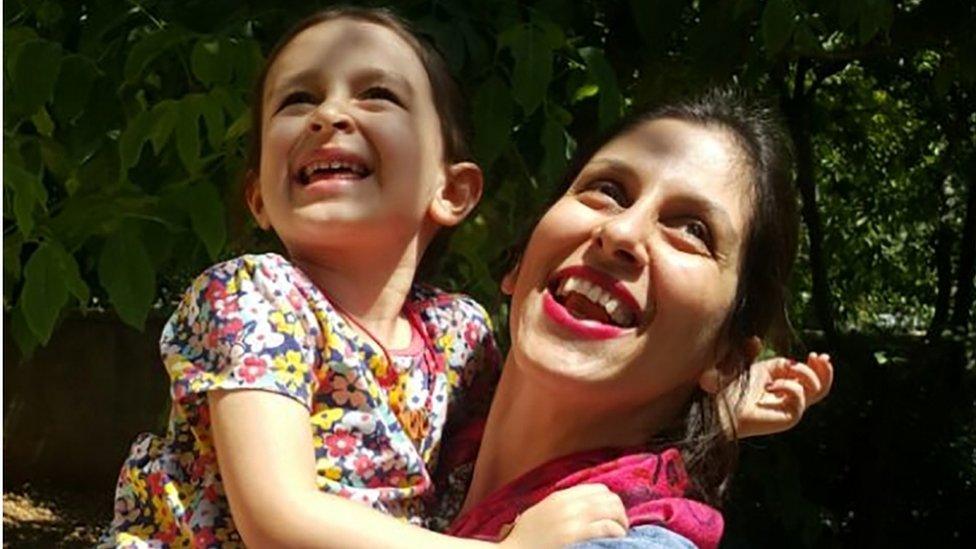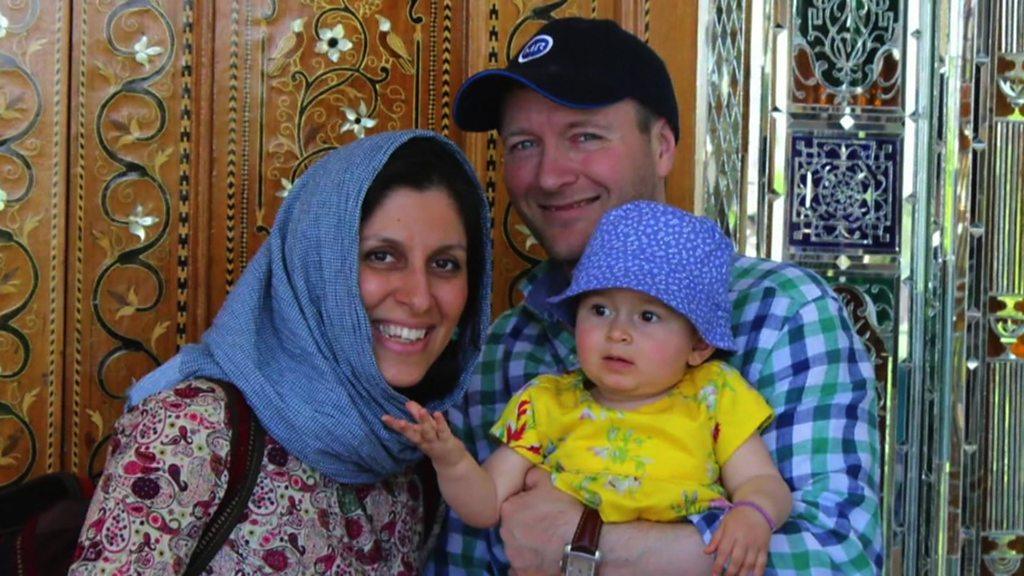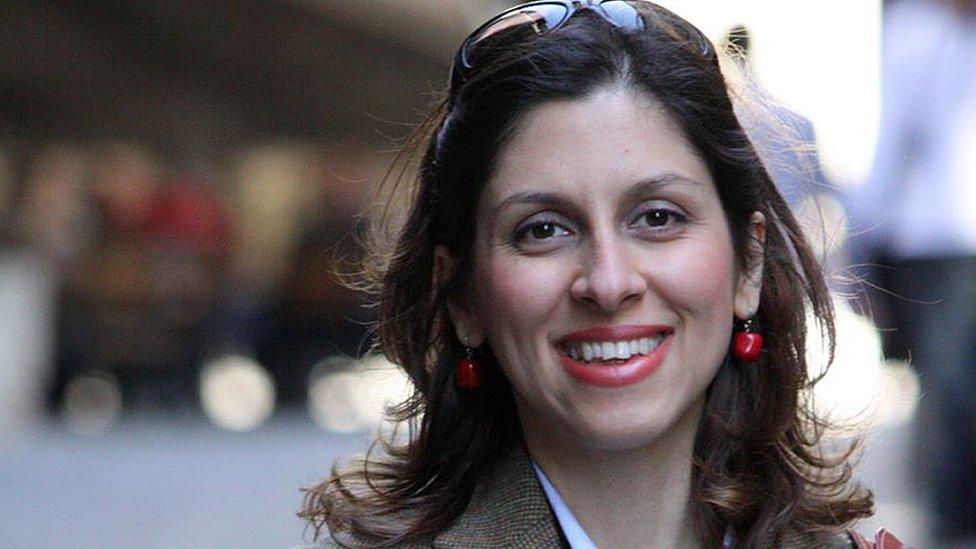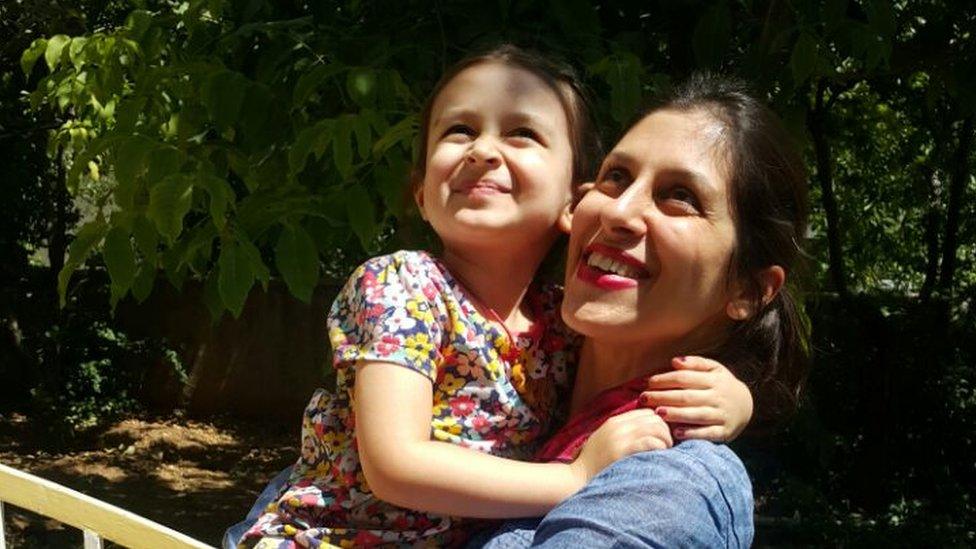Nazanin Zaghari-Ratcliffe: Iran offers prisoner swap
- Published

Nazanin Zaghari-Ratcliffe and her daughter Gabriella, who she saw during a temporary release from prison
Nazanin Zaghari-Ratcliffe could be released from jail in a prisoner swap with Iranians detained in the US and Australia, Iran has suggested.
The British-Iranian was jailed for five years in Iran in 2016 after being convicted of spying, which she denies.
Speaking in New York, Iranian foreign minister Javad Zarif said he felt sorry for Mrs Zaghari-Ratcliffe and had done his best to help her.
"Let's have an exchange. I'm ready to do it," he said.
Mr Zarif said there were Iranians being held in prison in the US, Germany and Australia on what he claimed were phony charges.
He highlighted one particular case of an Iranian woman who had given birth in an Australian prison, with her child now growing up outside prison.
"Nobody talks about this lady in Australia," he said.
"So, what can I do as a foreign minister? I put this offer on the table publicly now. Exchange them," he said, adding that he had the authority to do it.
He said he made a previous offer to the US six months ago but got no response.

Prisoner exchanges can take years to arrange
By James Landale, BBC diplomatic correspondent
At first sight, the Iranian offer of a prisoner swap to release Nazanin Zaghari-Ratcliffe appears positive.
These are the first substantive remarks Iran's foreign minister has made about her case since the UK government gave her diplomatic protection last month.
British officials had feared that Iran might react negatively to the granting of this new status, which turned the case into a formal legal dispute between both countries.
Instead Tehran's first response appears to be the offer of some kind of deal.
The move also shows that Iran does indeed seem willing to use Mrs Zaghari-Ratcliffe for diplomatic leverage, something it has in the past denied.
But diplomats do not think this means any deal is immediately on the cards.
Prisoner exchanges can take years to arrange. And they are no easier if several different countries are involved.

Richard Ratcliffe, Mrs Zaghari-Ratcliffe's husband, said he was surprised and disoriented by the announcement.
He said he was not sure whether it was a serious proposal or if it was said as part of a wider context.
"Normally my sense with Iran is nothing is flippant, and so it will have a meaning, but it might not be the obvious meaning," he said.
Mr Ratcliffe said a prisoner swap was only mentioned in one of the 40 or so messages he had received from Iranian authorities about his wife's case.
"It has felt increasingly that we are in the doorway, and we might be held in the doorway for a while, but Nazanin's situation cannot go on for much longer," he said.
"It's always good when we're not forgotten."
On Wednesday, the Foreign Office said the treatment of all British-Iranians detained in Iran, including Mrs Zaghari-Ratcliffe, was a priority for the government.
"We remain concerned about all of our consular cases and raise them at every level and every opportunity," a spokesperson said.
Exact figures for the number of British-Iranians held in Iran are not available, and some families do not publicise the cases, for fear of making the situation worse.
Why one mother's personal plight is part of a complicated history between Iran and the UK (video published August 2019 and last updated in October 2019)
Mrs Zaghari-Ratcliffe, 41, was a project manager for the Thomson Reuters Foundation and lived in London when she was arrested in Iran in April 2016.
She was later sentenced to five years in prison for allegedly plotting against the Iranian government.
She maintains her innocence, and says she was on holiday in Iran taking her daughter Gabriella to visit her parents.
- Published8 March 2019

- Published7 March 2019
- Published23 May 2022

- Published14 January 2019

- Published14 January 2019
